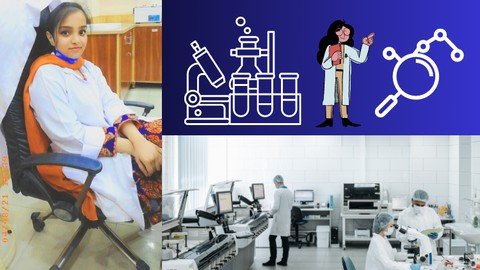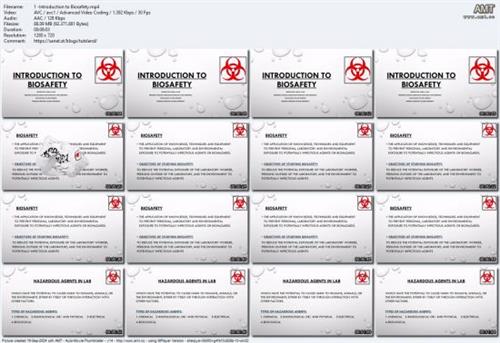
Published 9/2024
MP4 | Video: h264, 1280x720 | Audio: AAC, 44.1 KHz, 2 Ch
Language: English | Duration: 2h 29m | Size: 1.44 GB
Learn the Basics of laboratory safety and ethics
What you'll learn
To acquaint students with principles of biosafety
Ethical perspectives pertaining to biotechnology
Complete guide for students entering the laboratory for the first time.
Students will be able to list the routes of exposure for a pathogen to a human being
Requirements
Must have Good Internet Connection, and a device like laptop, smartphone or desktop
Description
Biosafety prevents large-scale loss of biological integrity, focusing both on ecology and human health. These prevention mechanisms include the conduction of regular biosafety reviews in laboratory settings and strict guidelines to follow. Biosafety is used to protect from harmful incidents. Many laboratories handling biohazards employ an ongoing risk management assessment and enforcement process for biosafety. Failures to follow such protocols can lead to an increased risk of exposure to biohazards or pathogens. Human error and poor technique contribute to unnecessary exposure and compromise the best safeguards for protection.Biosafety is related to several fields:In ecology (referring to imported life forms from beyond ecoregion borders),In agriculture (reducing the risk of alien viral or transgenic genes, genetic engineering, or prions such as BSE/"MadCow", reducing the risk of food bacterial contamination)In medicine (referring to organs or tissues of biological origin, genetic therapy products, viruses; levels of lab containment protocols measured as 1, 2, 3, 4 in rising order of danger),In chemistry (i.e., nitrates in water, PCB levels affecting fertility)In exobiology (i.e., NASA's policy for containing alien microbes that may exist on space samples. See planetary protection and interplanetary contamination), andIn synthetic biology (referring to the risks associated with this type of lab practice)Bioethics is both a field of study and professional practice, interested in ethical issues related to health (primarily focused on the human but also increasingly includes animal ethics), including those emerging from advances in biology, medicine, and technologies. It proposes the discussion about moral discernment in society (what decisions are "good" or "bad" and why) and it is often related to medical policy and practice, but also to broader questions such as environment, well-being, and public health. Bioethics is concerned with the ethical questions that arise in the relationships among life sciences, biotechnology, medicine, politics, law, theology, and philosophy. It includes the study of values relating to primary care, other branches of medicine ("the ethics of the ordinary"), ethical education in science, animal, and environmental ethics, and public health.Bioethics as a field of professional practice (although not a formal profession) developed initially in North America in the 1980s and 1990s, in the areas of clinical/medical ethics and research ethics. Slowly internationalizing as a field, since the 2000s professional bioethics has expanded to include other specialties, such as organizational ethics in health systems, public health ethics, and more recently Ethics of artificial intelligence. Professional ethicists may be called consultants, ethicists, coordinators, or even analysts; and they may work in healthcare organizations, government agencies, and in both the public and private sectors. They may be full-time employees, independent consultants, or have cross-appointments with academic institutions, such as research centers or universities.Learned societies and professional associationsThe field of bioethics has developed national and international learned societies and professional associations, such as the American Society for Bioethics and Humanities, the Canadian Bioethics Society, the Canadian Association of Research Ethics Boards, the Association of Bioethics Program Directors, the Bangladesh Bioethics Society and the International Association of Bioethics
Who this course is for
This course could function as an introduction to biosafety for undergraduates who want to minor in biosafety and/or have a career interest in biosafety or occupational safety. undergraduate students entering the laboratory for the first time. This course is designed to be a primary component of the introductory training for the sciences and is intended to improve safety in the teaching and research labs.
Biotechnology student
Medical school student
medical lab students
research students
Homepage:
- Kod: Zaznacz wszystko
https://www.udemy.com/course/biosafety-and-bioethics/
Screenshots

Download link
rapidgator.net:
nitroflare.com:

 News
News